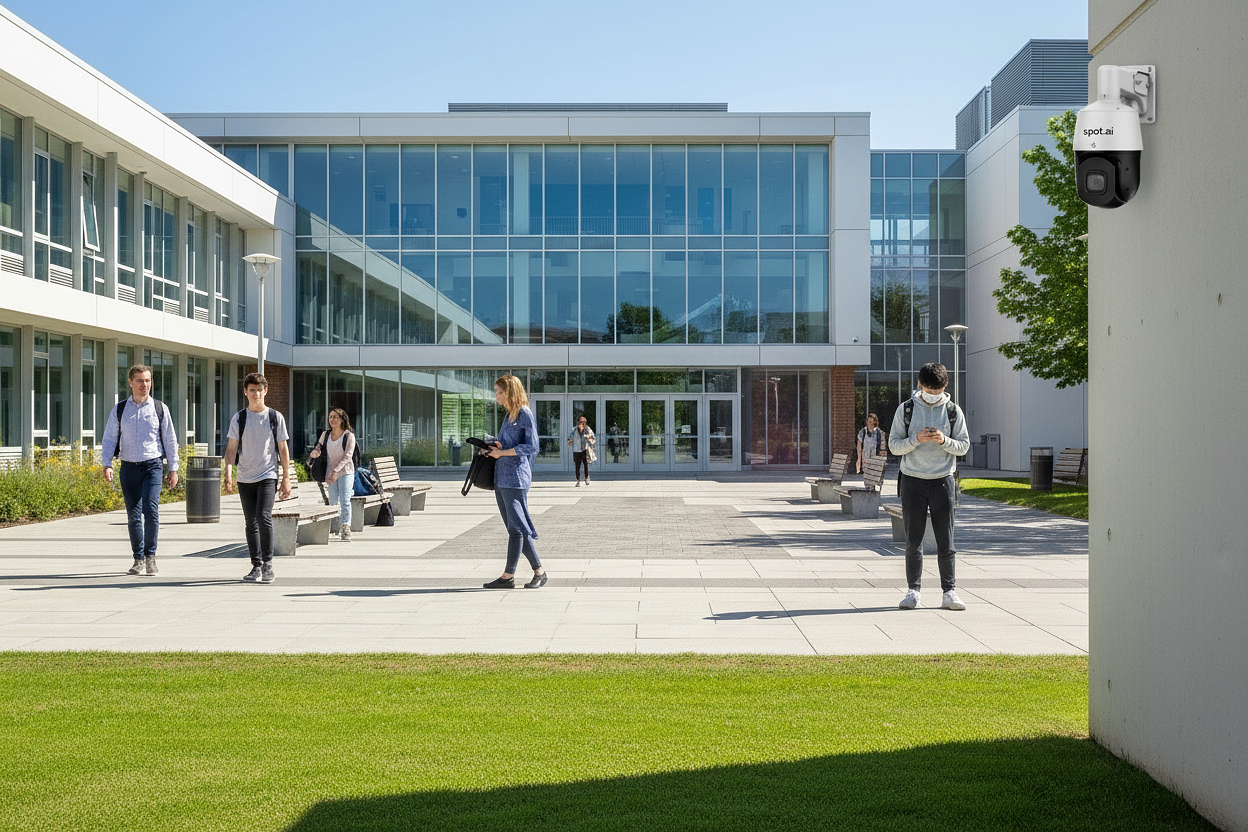Every school faces a dual obstacle: keeping students safe and operations running smoothly—all while budgets tighten and security needs evolve. With sprawling campuses, sensitive data, and a need for rapid incident response, schools require more than legacy camera systems. They need intelligent, scalable, and easy-to-manage solutions.
This is where Cloud & VMS Platforms for Schools come in. These systems blend video AI analytics, hybrid storage, and seamless integrations to deliver video monitoring with operational data—boosting campus safety, streamlining operations, and peace of mind for educators and families alike. In this guide, we’ll break down the top 7 platforms, spotlighting how each stacks up on features, cost, and implementation. Whether you’re running a single campus or a multi-site district, you’ll leave equipped to make an informed choice for your school’s future.
At-a-glance: Top 7 cloud & VMS platforms for schools
System Name | Best For | Key Features | Integration | Flexibility | Storage Type | Notable Pros / Cons |
|---|---|---|---|---|---|---|
Spot AI | Schools seeking fast, AI-powered insights and easy deployment | Video AI analytics, rapid search, hybrid cloud, intuitive dashboard | Works with most IP cameras | Scales from single school to district | Hybrid (cloud + on-prem) | Pros: Deploys in <1 week, camera-agnostic, low TCO |
Rhombus | Mid-sized districts needing real-time alerts | Video AI analytics (weapons, vaping), zero-touch deployment, automated updates | Camera-agnostic | Cloud-native | Cloud | Pros: Real-time alerts, easy scaling |
Genetec | K–12 and universities seeking unified security | Video + access control, ALPR, hybrid-cloud, automated firmware | Open architecture | Hybrid (cloud/on-prem) | Hybrid | Pros: Full campus coverage, open integrations |
Verkada | Large campuses needing all-in-one stack | Cameras, sensors, visitor mgmt, edge processing, offline storage | Proprietary | Cloud-centric | Hybrid | Pros: Rapid deployment, easy UI |
Eagle Eye | Private schools, legacy system upgrades | Video AI anomaly detection, encrypted cloud, legacy camera support | Camera-agnostic | Hybrid | Cloud/Hybrid | Pros: Saves 35% vs on-prem, works with old cameras |
Avigilon | Universities with high security needs | Appearance Search, high-res cameras, NDAA-compliant, advanced AI | Integrates with access control | On-prem or cloud | On-prem/Cloud | Pros: Advanced video AI, forensic search |
Milestone | Multi-campus, open platform needs | 6,000+ camera support, BriefCam analytics, modular cloud/on-prem | Open platform | Highly modular | Flexible | Pros: Powerful analytics, flexible deployment |
Deep dive: How the leading cloud & VMS platforms for schools stack up
Below, we break down each solution using the same criteria: core technology, implementation, cost, integration, use cases, performance, and support. This apples-to-apples approach helps you see what matters most for your school’s security and campus productivity.
Spot AI
Core technology capabilities and specifications
Spot AI delivers a hybrid-cloud video AI platform built for education. Its video AI engine enables rapid incident search, timely alerts, and operational data for both security and campus management. The system is camera-agnostic, supporting most IP cameras—including existing legacy hardware—without vendor lock-in. The intuitive dashboard allows multiple teams to collaborate, view all campuses, and clip/share footage in seconds.Implementation requirements and timeline
Spot AI is designed for rapid deployment, with most schools going live in less than a week. Minimal IT resources are required; the on-site intelligent video recorder (IVR) auto-discovers cameras and connects to secure cloud storage. Software updates and health diagnostics are automatic, reducing the IT workload.Total cost considerations
Spot AI’s flexible subscription model avoids large upfront hardware expenditures. Hybrid storage reduces the need for expensive servers, and the camera-agnostic approach leverages prior investments. Ongoing expenses are predictable and transparent, with low maintenance requirements.Integration capabilities with existing systems
Integrates with most ONVIF-compliant IP cameras, access control systems, and school management platforms. Open APIs allow for custom integrations, supporting future expansion and smoother workflows with video AI.Target use cases and industry applications
Ideal for K–12 districts and higher education. Use cases include securing campus perimeters, monitoring for unauthorized entry, detecting crowding or loitering, and enhancing student and staff safety.
Rhombus
Core Technology Capabilities and Specifications
Rhombus offers a cloud-managed VMS with advanced video AI analytics, including weapon, vape, and unauthorized access detection. The platform supports timely alerts and automated system updates. Camera-agnostic architecture enables use of diverse hardware.Implementation Requirements and Timeline
Zero-touch deployment allows for fast rollout, typically within days. All configuration and management are handled via the cloud dashboard, minimizing onsite IT work.Total Cost Considerations
Subscription-based pricing ranges from $29–$99 per camera monthly. Expenditures for hardware are reduced by leveraging existing cameras, and automated updates cut maintenance expenses.Integration Capabilities with Existing Systems
Integrates with school information systems, access control, and various third-party platforms. Open API supports custom workflows, but advanced analytics are bandwidth-dependent.Target Use Cases and Industry Applications
Suited for mid-sized schools and districts. Excels at proactive incident detection, staff safety, and enhanced productivity with video AI for monitoring high-traffic areas.
Genetec Security Center
Core Technology Capabilities and Specifications
Genetec unifies video monitoring, access control, and ALPR in a single hybrid-cloud platform. Automated firmware updates and open architecture support diverse hardware and sensors.Implementation Requirements and Timeline
Requires professional installation, with rollout timelines ranging from several weeks to a few months depending on campus size.Total Cost Considerations
On-premise licensing starts at $15,000/year, plus hardware. Hybrid cloud reduces some infrastructure costs, but initial investment remains high.Integration Capabilities with Existing Systems
Open platform allows integration with third-party cameras, access control, and school management systems.Target Use Cases and Industry Applications
Designed for K–12 and universities seeking unified security and streamlined campus management. Supports large-scale security deployments and unified operational oversight in educational settings.
Verkada
Core Technology Capabilities and Specifications
Verkada combines cloud-managed cameras, environmental sensors, and visitor management in an all-in-one stack. Edge processing minimizes bandwidth, and onboard storage ensures footage retention during outages.Implementation Requirements and Timeline
Rapid deployment, often live within days. Plug-and-play hardware and intuitive UI minimize IT lift.Total Cost Considerations
Annual per-device licensing ($1,200–$2,500) covers hardware, cloud storage, and support. Proprietary hardware increases long-term expenditures and limits flexibility.Integration Capabilities with Existing Systems
Integrates with select access control and environmental systems. Closed ecosystem restricts third-party camera support.Target Use Cases and Industry Applications
Best for large campuses seeking unified video monitoring, environmental monitoring, and visitor management. Supports workplace productivity with video AI.
Eagle Eye Networks
Core Technology Capabilities and Specifications
Eagle Eye delivers a cloud VMS with AI-driven anomaly detection, encrypted backups, and hybrid deployment options. Camera-agnostic design extends the life of existing hardware.Implementation Requirements and Timeline
Quick deployment using existing cameras, often within days. Minimal onsite hardware required.Total Cost Considerations
Subscription pricing ($50–$150/camera/month) is cost-effective, especially for schools upgrading legacy systems. No major upfront investment.Integration Capabilities with Existing Systems
Supports most IP cameras and integrates with access control systems. Limited advanced analytics in base tier.Target Use Cases and Industry Applications
Ideal for private schools and small districts. Enhances campus security and optimizes campus workflows with video AI-powered monitoring.
Avigilon
Core Technology Capabilities and Specifications
Avigilon’s Control Center VMS leverages high-resolution cameras and advanced video AI analytics (e.g., Appearance Search, perimeter breach detection). NDAA-compliant and scalable for large campuses.Implementation Requirements and Timeline
Requires dedicated server infrastructure and professional installation. Implementation can take several weeks to months.Total Cost Considerations
Substantial upfront hardware investment. Pricing is opaque and varies by configuration.Integration Capabilities with Existing Systems
Integrates with access control and third-party systems. Supports both on-prem and cloud storage.Target Use Cases and Industry Applications
Tailored for universities and high-security campuses. Excels in large-scale video monitoring and forensic video search.
Milestone Systems
Core Technology Capabilities and Specifications
Milestone’s XProtect VMS supports over 6,000 camera models and integrates with BriefCam analytics for behavioral detection (e.g., vaping, crowding). Flexible deployment: cloud, on-prem, or hybrid.Implementation Requirements and Timeline
Modular design enables phased rollouts. Full deployment can take weeks to months, depending on scale.Total Cost Considerations
Modular pricing starts at $20,000/year, with additional video AI analytics as paid add-ons. Pricing increases with advanced features.Integration Capabilities with Existing Systems
Open platform allows extensive third-party integrations, supporting improved productivity with video AI and large-scale monitoring.Target Use Cases and Industry Applications
Best for multi-campus districts with diverse monitoring needs. Enables advanced security and operational analytics across multiple sites.
See Spot AI in action for your school
Explore how the right cloud and VMS platform can strengthen your students’ safety and streamline campus operations. Spot AI helps schools accelerate investigations and modernize video monitoring with AI—all in a platform that’s easy to deploy and scale.
Ready to experience Spot AI? Request a personalized demo to see how video AI can support your campus security goals.
Frequently asked questions
What are the key benefits of cloud & VMS platforms for schools?
Cloud & VMS platforms offer centralized video management, timely video AI analytics, and hybrid storage options. They help schools reduce IT overhead, scale security across multiple campuses, and accelerate incident investigations—delivering both safety and better operational outcomes.
Can we use our existing cameras with cloud-based VMS platforms?
Many leading platforms, including Spot AI, Rhombus, and Eagle Eye, are camera-agnostic and support most IP cameras. This leverages your prior investments and simplifies the upgrade process.
What is the typical deployment timeline for a new VMS platform?
Deployment varies by vendor. Spot AI and similar cloud-native solutions can be live in under a week, while larger, hardware-intensive systems like Genetec or Avigilon may take several weeks to months due to installation and integration requirements.
How do cloud & VMS platforms enhance campus operations in schools?
Video AI analytics automate incident detection, streamline incident investigations, and offer data for resource allocation. This reduces manual review time and frees staff to focus on core educational and safety priorities.
<h3>What are the best video AI analytics features for school security?</h3>
<p>The best video AI features align with your school's specific safety goals. For proactive security, analytics that detect weapons, vaping, or loitering provide timely alerts for staff to intervene. To secure perimeters, features like unauthorized entry detection are critical. For rapid incident resolution, AI-powered search allows you to find specific people or events in seconds, while crowd detection helps manage student flow and improve campus operations.</p>
About the author
Amrish Kapoor is VP of Engineering at Spot AI, leading platform and product engineering teams that build the scalable edge-cloud and AI infrastructure behind Spot AI’s video AI—powering operations, safety, and security use cases.

























.png)
.png)
.png)